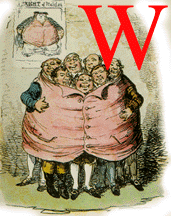On Chapter 76 of Davenport Dunn, Lever’s narrator describe’s the damage his main character has done to rich and poor alike, pointing out that he had taken in captains of commerce and government alike. — George P. Landow

hile, therefore, many deplored the awful crime which had just been committed, and sorrowed over the stain cast upon our age and our civilization, there arose amidst their grief the wilder and more heartrending cry of thousands brought to destitution and beggary by this bold, bad man.
Of the vast numbers who had dealings with him, scarcely any escaped: false title-deeds, counterfeited shares, forged scrip abounded. The securities intrusted to his keeping in all the trustfulness of an unlimited confidence had been pledged for loans of money; vast sums alleged to have been advanced on mortgage were embezzled without a shadow of security. From the highest in the peerage to the poorest peasant, all were involved in the same scheme of ruin, and the great fortunes of the rich and the hardly saved pittance of the poor alike engulfed. So suddenly did the news break upon the world that it actually seemed incredible. It was not alone a shock given to mercantile credit and commercial honesty, but it seemed an outrage against whatever assumed to be high-principled and honourable. It could not be denied that this man had been the world's choicest favourite. Upon him had been lavished all the honours and rewards usually reserved for the greatest benefactors of their kind. The favours of the Crown, the friendship and intimacy with the highest in station, immense influence with the members of the Government, power and patronage to any extent, and, greater than all these, because more wide-spread and far-reaching, a sort of acceptance that all he said and did and planned and projected was certain to be for the best, and that they who opposed his views or disparaged his conceptions were sure to be mean-minded and envious men, jealous of the noble ascendancy of his great nature. And all this because he was rich and could enrich others!
Had the insane estimate of this man been formed by those fighting the hard battle of fortune, and so crushed by poverty that even a glimpse of affluence was a gleam of Paradise, it might have been more pardonable; but far from it. Davenport Dunn's chief adherents and his primest flatterers were themselves great in station and rolling in wealth; they were many of them the princes of the land. The richest banker of all Europe — he whose influence has often decided the fate of contending nations — was Dunn's tried and trusted friend. The great Minister, whose opening speech of a session was the mot d'ordre for half the globe, had taken counsel with him, stooping to ask his advice, and condescending to indorse his opinions. A proud old noble, as haughty a member of his order as the peerage possessed, did not disdain to accept him for a son-in-law; and now the great banker was to find himself defrauded, the great minister disgraced, and the noble Lord who had stooped to his alliance was to see his estate dissipated and his fortune lost! [682-83]
Related material
- Real and Fictional Swindlers: Lever's Davenport Dunn & the Financial Bubble of the Fifties
- Charles Lever's Swindler as Hero in Davenport Dunn (1858-59)
Last modified 16 December 2019